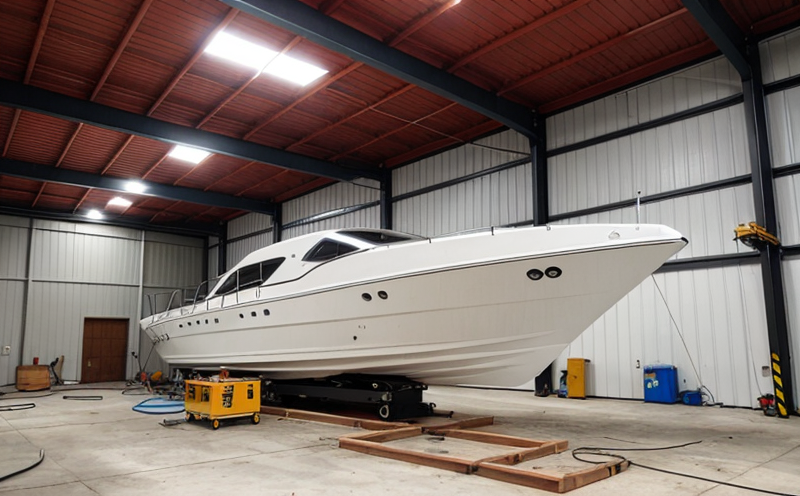ASTM E2698 Computed Radiography Testing of Hull Welds
The ASTM E2698 standard specifies the use of computed radiography (CR) for inspecting the structural integrity of hull welds in marine and ship equipment. This non-destructive testing (NDT) method is crucial for ensuring that critical components meet safety and operational standards, especially in environments where corrosion and stress are significant concerns.
The process involves subjecting the welded areas to X-ray or gamma radiation, which penetrates the material and is absorbed differently based on thicknesses and defects present. The radiographic image is then captured using a CR plate, which converts this radiation into an electrical signal that can be processed by a computer. This allows for detailed analysis of the internal structure, identifying any imperfections such as cracks, porosity, or incomplete fusion.
The significance of this test lies in its ability to detect hidden flaws before they lead to failures that could compromise safety and operational efficiency. For marine equipment, where hull integrity is paramount, these tests are essential for compliance with international standards like ISO 10356 and EN 14087. The precision offered by CR testing ensures that only high-quality welds pass inspection, reducing the risk of costly repairs or accidents at sea.
Our state-of-the-art facility utilizes advanced CR equipment from reputable manufacturers such as Hitachi and FujiFilm. Our team of certified technicians performs these tests according to stringent ASTM E2698 guidelines, ensuring accurate results and reliable data. Specimen preparation involves cleaning the area thoroughly before applying the radiographic film or digital sensor. After exposure, the images are processed digitally for enhanced clarity and ease of interpretation.
For quality managers and compliance officers responsible for maintaining high standards in marine equipment manufacturing, this service offers peace of mind knowing that every hull weld undergoes rigorous inspection. This is particularly important given the stringent requirements set forth by international bodies like the American Bureau of Shipping (ABS) and Lloyd's Register.
Our testing procedures also comply with ISO 5817, ensuring consistency across various projects. The detailed reports generated from these tests provide comprehensive insights into the structural health of each hull weld, supporting informed decision-making during procurement processes or R&D initiatives aimed at improving design and manufacturing techniques.
- Non-destructive evaluation (NDE) ensures that no damage is caused to the material being inspected.
- The ability to detect internal flaws enhances product quality and reliability.
- Compliance with international standards like ASTM E2698 and ISO 5817 supports global market access for manufacturers.
Why It Matters
The integrity of hull welds directly impacts the safety and operational efficiency of marine vessels. Cracks or defects within these structures can lead to catastrophic failures during operation, posing significant risks not only to personnel but also to surrounding environments. By adhering strictly to ASTM E2698 standards, we ensure that every hull weld undergoes thorough inspection, thereby minimizing potential hazards.
From a business perspective, ensuring compliance with these stringent regulations helps manufacturers maintain their reputation for reliability and safety, fostering trust among clients and regulatory bodies alike. Additionally, it facilitates smoother transactions by aligning with international standards recognized worldwide. In an increasingly competitive market where quality assurance is key to success, our computed radiography testing service stands out as a critical component of any comprehensive quality management strategy.
For R&D engineers involved in developing new materials or improving existing designs, this service provides invaluable data that can be used to refine processes and enhance overall performance. The detailed reports generated from these tests offer insights into the effectiveness of different welding techniques under various conditions, enabling continuous improvement through iterative testing cycles.
Moreover, compliance with such rigorous standards helps procurement teams source materials and components from suppliers who meet the highest quality benchmarks. This ensures that all parts integrated into a vessel’s hull are equally reliable, further enhancing overall vessel reliability and safety.
Eurolab Advantages
At Eurolab, we pride ourselves on delivering exceptional computed radiography testing services tailored specifically for the marine & ship equipment sector. Our advantages include:
- Expertise and Experience: With years of experience in performing ASTM E2698 compliant tests, our team is highly skilled and knowledgeable.
- Advanced Equipment: Utilizing cutting-edge CR equipment from trusted brands ensures consistently high-quality results.
- Comprehensive Reporting: Detailed reports not only meet but exceed industry expectations, providing actionable insights for decision-makers.
- International Recognition: Our adherence to global standards like ISO 5817 and EN 14087 ensures that our services are recognized internationally.
We offer a seamless testing process from initial consultation through final reporting, making it easier for clients to integrate this vital step into their workflow. Our commitment to excellence has earned us a reputation as leaders in the field, trusted by major players across the maritime industry.





